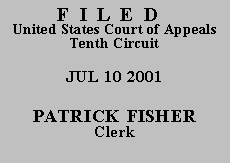 PUBLISH
PUBLISH
 PUBLISH
PUBLISH
UNITED STATES COURT OF APPEALS
TENTH CIRCUIT
| W.N.J. and J.A.S.,
and J.O.H.N. and D.M.W., Plaintiffs-Appellants,
v.
DAVID YOCOM, Salt Lake County
Attorney, Defendant-Appellee. |
No. 00-4124 |
Appeal from the United States District Court
for the District of Utah
(D.C. No. 91-CV-645)
Thomas D. Roberts, Assistant Attorney General (Jan Graham, Utah Attorney General and Mark E. Burns, Assistant Attorney General, with him on the brief), Salt Lake City, Utah, for David Yocom, Salt Lake County Attorney, Defendant/Appellee.
Plaintiffs, several unmarried residents of the State of Utah, brought this action to challenge the state's laws against fornication and sodomy as engaged in by unmarried heterosexual adults. The district court dismissed the case on summary judgment, determining that plaintiffs lacked standing and their claims were unripe. We dismiss this appeal on other grounds. Because plaintiffs used pseudonyms without first obtaining permission from the district court, the case was improperly filed and must be dismissed for lack of appellate jurisdiction.
"Proceeding under a pseudonym in federal courts is, by all accounts, 'an unusual procedure.'" Femedeer v. Haun, 227 F.3d 1244, 1246 (10th Cir. 2000) (quoting MM v. Zavaras, 139 F.3d 798, 800 (10th Cir. 1998)). Rule 10(a) of the Federal Rules of Civil Procedure requires that every pleading contain a caption setting forth, inter alia, "the title of the action," and this title must include "the names of all the parties." Similarly, Rule 17(a) mandates that "every action shall be prosecuted in the name of the real party in interest." See also Femedeer, 227 F.3d at 1246. The Rules provide no exception that allows parties to proceed anonymously or under fictitious names such as initials. Nat'l Commodity & Barter Ass'n v. Gibbs, 886 F.2d 1240, 1245 (10th Cir. 1989) (per curiam). Nevertheless, in "certain limited circumstances," courts do allow a party to proceed under a pseudonym. Id. "Significant privacy interests," such as plaintiffs' interest in keeping their sexual habits from public scrutiny, sometimes suffice. Id.; see also Femedeer, 227 F.3d at 1246 (case must "involv[e] matters of a highly sensitive and personal nature"); Coe v. U.S. Dist. Ct. for Dist. of Colo., 676 F.2d 411, 416 (10th Cir. 1982) (listing cases allowing pseudonyms for challenges to laws involving birth control, abortion, and homosexuality, among others).
When a party wishes to file a case anonymously or under a pseudonym, it must first petition the district court for permission to do so. Nat'l Commodity & Barter Ass'n, 886 F.2d at 1245. If a court grants permission, it is often with the requirement that the real names of the plaintiffs be disclosed to the defense and the court but kept under seal thereafter. Id. Where no permission is granted, "the federal courts lack jurisdiction over the unnamed parties, as a case has not been commenced with respect to them." Id.
In this case, plaintiffs failed to request permission from the district court before proceeding anonymously. At our request, two plaintiffs filed sealed affidavits giving their true names to this court. They also secured an order by the original magistrate judge granting leave to proceed using pseudonyms, filed after the start of this appeal but dated nunc pro tunc to the filing of the action. Those acts cannot cure the failure to secure permission at filing. We raised this issue sua sponte because the defect affects our fundamental jurisdiction to hear the appeal. See id. at 1245 n.3.
A lack of jurisdiction cannot be corrected by an order nunc pro tunc. Central Laborers' Pension, Welfare & Annuity Funds v. Griffee, 198 F.3d 642, 644 (7th Cir. 1999). As noted in that case, "the only proper office of a nunc pro tunc order is to correct a mistake in the records; it cannot be used to rewrite history." Id. The lack of original jurisdiction in the district court likewise cannot be cured after an appeal has been filed since, as a general matter, a district court loses jurisdiction over a case once a notice of appeal has been filed. Int'l Paper Co., v. Whitson, 595 F.2d 559, 561 (10th Cir. 1979). A district court may still retain jurisdiction over the case to deal with collateral matters such as attorneys' fees, Lancaster v. Independent School Dist. No. 5, 149 F.3d 1228, 1237 (10th Cir. 1998), or to correct clerical errors under Fed.R.Civ.P. 60(a). However, it is well-settled that a district court cannot grant a substantive motion, such as those filed pursuant to Fed.R.Civ.P. 60(b), without first notifying the court of appeals of its intention to do so upon proper remand. Aldrich Enterprises, Inc. v. United States, 939 F.2d 1134, 1143 (10th Cir. 1991).(1)
In sum, the district court was without jurisdiction while this appeal was pending to grant nunc pro tunc plaintiffs' motion to use pseudonyms. Because the district court never had jurisdiction over the plaintiffs when it granted defendants' motion for summary judgment, we have no authority to consider an appeal of that decision. Accordingly, plaintiffs' appeal is DISMISSED.
*. The Honorable John R. Gibson, United States Circuit Judge for the Eighth Circuit, sitting by designation.
1.A district court may, however, consider a Rule 60(b) motion and deny it on its merits without remand by the Court of Appeals. Aldrich, 938 F.2d at 1143.